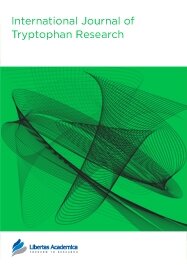

Publication Date: 12 Feb 2010
Type: Original Research
Journal: International Journal of Tryptophan Research
doi: 10.4137/IJTR.S4260

Kynurenic acid (KYNA) is an endogenous metabolite of tryptophan. Studies have revealed increased brain KYNA levels in patients with schizophrenia. Prepulse inhibition (PPI) is a behavioral model for sensorimotor gating and found to be reduced in schizophrenia. Previous studies have shown that pharmacologically elevated brain KYNA levels disrupt PPI in the rat. The aim of the present study was to investigate the receptor(s) involved in this effect. Rats were treated with different drugs selectively blocking each of the sites that KYNA antagonizes, namely the glutamate recognition site of the N-methyl-D-aspartate receptor (NMDAR), the α7* nicotinic acetylcholine receptor (α7nAChR) and the glycine site of the NMDAR. Kynurenine (200 mg/kg) was given to replicate the effects of increased levels of KYNA on PPI. In order to block the glutamate recognition site of the NMDAR, CGS 19755 (10 mg/kg) or SDZ 220–581 (2.5 mg/kg) were administered and to antagonize the α7nAChR methyllycaconitine (MLA; 6 mg/kg) was given. L-701,324 (1 and 4 mg/kg) or 4-Chloro-kynurenine (4-Cl-KYN; 25, 50 and 100 mg/kg), a drug in situ converted to 7-Chloro-kynurenic acid, were used to block the glycine-site of the NMDAR. Administration of SDZ 220-581 or CGS 19755 was associated with a robust reduction in PPI, whereas L-701,324, 4-Cl-KYN or MLA failed to alter PPI. Kynurenine increased brain KYNA levels 5-fold and tended to decrease PPI. The present study suggests that neither antagonism of the glycine-site of the NMDA receptor nor antagonism of the α7nAChR disrupts PPI, rather with regard to the effects of KYNA, blockade of the glutamate recognition-site is necessary to reduce PPI.
PDF (1.23 MB PDF FORMAT)
RIS citation (ENDNOTE, REFERENCE MANAGER, PROCITE, REFWORKS)
BibTex citation (BIBDESK, LATEX)
XML
PMC HTML
This is my second publication in Int J Tryptophan Res and my experience on this occasion was as great and enjoyable as with my first paper immediately preceding this one. I commend the Editors and the Editorial Staff of this new and exciting journal for their professionalism and dedication to science and scientific publishing.

All authors are surveyed after their articles are published. Authors are asked to rate their experience in a variety of areas, and their responses help us to monitor our performance. Presented here are their responses in some key areas. No 'poor' or 'very poor' responses were received; these are represented in the 'other' category.See Our Results
Copyright © 2013 Libertas Academica Ltd (except open access articles and accompanying metadata and supplementary files.)
FacebookGoogle+Twitter
PinterestTumblrYouTube